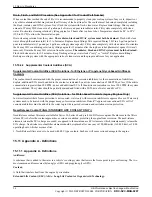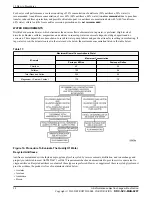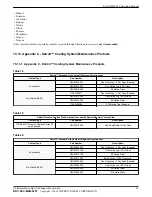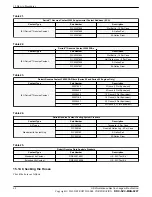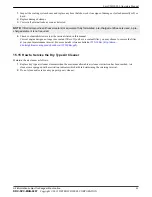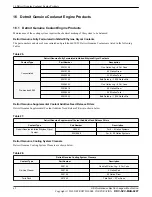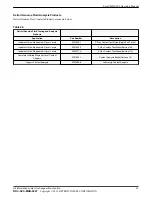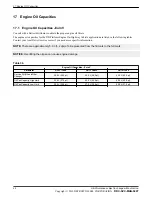
15.3.3
Biodiesel
1
General recommendations and guidelines
Detroit™ supports biodiesel as a renewable fuel. Biodiesel fuels are mono alkali esters of long chain fatty acids commonly
referred to as Fatty Acid Methyl Esters (FAME) and are derived from renewable resources through a chemical process called
transesterification.
Detroit™ approves the use of biodiesel fuel blends as follows:
• DD Family of Engines - Biodiesel blends up to 5% are allowed
• MBE900/4000 Engines - Biodiesel blends up to 5% are allowed
• S60 Engines - Biodiesel blends up to 20% are allowed*
*Engines built prior to MY 2004 may contain materials that are not compatible with biodiesel blends. Biodiesel blends above
5% are not recommended
2
.
For most recent information go to
https://dtnacontent-dtna.prd.freightliner.com/content/dam/public/dtna-
servicelit/ddc/pdfs/Lube_Oil_Coolant/Detroit_Bio_Fuel_Position_Statement.pdf
).
15.3.4
Prohibited Additives
The following fuel additives are not allowed and MUST NOT be mixed with diesel fuel:
•
Used Lubricating Oil
Do not use fuel blended with used lubricating oil. Detroit™ specifically prohibits the use of used
lubricating oil in diesel fuel. Used lubricating oil contains combustion acids and particulate materials which can severely
erode fuel injector components, resulting in loss of power and increased exhaust emissions. In addition, the use of drained
lubricating oil will increase maintenance requirements due to filter plugging and combustion deposits.
WARNING: FIRE
To avoid increased risk of a fuel fire, do not mix gasoline and diesel fuel.
NOTICE:
Detroit™ will not be responsible for any detrimental effects resulting from adding drained lubricating oil
or gasoline to the diesel fuel.
•
Gasoline
The addition of gasoline to diesel fuel will create a serious fire hazard. The presence of gasoline in diesel fuel
will reduce fuel cetane number and increase combustion temperatures. Drain and clean tanks which contain a mixture
of gasoline and diesel fuel as soon as possible.
•
Fuel Additives with Sulfur or Sulfated Ash
Do not use non-approved fuel additives containing sulfur or sulfated ash.
15.4 Engine Out of Fuel – How to Restart
When an engine has run out of fuel, there is a definite procedure to follow when restarting it.
NOTICE:
Never use the starting motor and fuel pump to prime the fuel filters. Prolonged use of the starting motor
and fuel pump to prime the fuel system can result in damage to the starter, fuel pump, and injectors.
Use the following procedure to prime the fuel system:
NOTE:
If a vehicle is on uneven ground, more fuel may be required.
1.
Fill the fuel tank with the recommended grade of fuel. If only partial filling is possible, add a minimum of 10% of the
total tank volume of fuel to the tank. For example, a 150-gallon tank would require a minimum of 15 gallons of fuel.
2.
Connect a Detroit-approved priming tool or operate the engine-mounted hand primer for three minutes or 250 strokes.
3.
Turn on the ignition switch.
4.
Wait for the engine system indicator lights on the instrument panel to go out.
EuroV MBE 900 Operators Manual
All information subject to change without notice.
49
DDC-SVC-MAN-0207
Copyright © 2019 DETROIT DIESEL CORPORATION






















